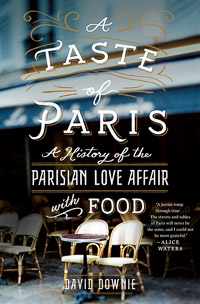A Taste of Paris
Book Review

A Taste of Paris: A History of the Parisian Love Affair with Food
David Downie
Hardcover, 304 pages
US $26.99
St. Martin's Press, 2017
ISBN 9781250082930
It isn't often that one
can use the phrase "a history book with mouthfeel," but David Downie's
A Taste
of Paris fits that description better than most. The publisher poses the
question, "What is it about the history of Paris that has made it a food lover's
paradise?" Downie, who has been writing about food and Paris since the 1980s, is
happy to supply the answers in 304 pages of engaging, appetizing prose.
A Taste of Paris (subtitled "A History of the
Parisian Love Affair with Food") begins with an "Aperitif," which describes
how the author had a "foretaste of the fun" in store for him when he first
visited Paris as a young man in 1976. A decade later, he moved to Paris, living
in a "seventh-floor, cold-water walk-up maid's room" while "mapping out Paris'
gastronomic topography--the markets, stores, restaurants, and cafés that
became my second home."
As the book progresses, it jumps from the present to the past
(and forward again), chronicling Parisian culinary life in Roman times, the
medieval era, the heyday of Versailles, and the two-plus centuries since the
French Revolution. The author delivers a few surprises along the way:
-
Who would have guessed, for example, that Louis XIV had a court
audience for his bimonthly bowel purges?
-
And how many tourists are aware that the Sun King's kitchen garden, the
Potager du Roi, is still in business,
and that "depending on the season, you might be able to buy pears, melons,
strawberries, figs, cabbages, pumpkins, and peas, stuff them into your capacious
1970s string bag and take them back to your temporary Paris lodgings for a
feast"?
A small number of recipes and cooking tips are also scattered
throughout the book. Here's the author's translation of a recipe for roast peacock or swan
from Guillaume Tirel, a.k.a. Taillevent, the 14th Century chef whose nom de
cuisine has been borrowed by a Michelin-starred restaurant:
Slaughter your bird as if it were a goose, keep the head and
tail separate for later use, lard or bard it, roast it until golden, and season
it with fine salt. A roast peacock or swan lasts a month or more once it is
cooked. Should it become moldy on the surface, remove the mold, and beneath you
will find it whole and firm.
(Note: The above recipe is from a chapter titled "Cry Fowl,"
which demonstrates the author's knack for a catchy phrase.)
But there's more to A Taste of Paris than food history,
royal gossip, punalicious phrases, and medieval culinary tips. In Part 10, "Digestif," Mr.
Downie addresses topics such as Nouvelle Cuisine and whether French food is in
decline. "How long have critics bewailed the death of the novel?" Mr.
Downie asks. "Hint: about as long as others have lamented the death of French cooking."
He
adds:
It's a funny thing: I keep going out to shop or eat in my
Paris neighborhood expecting disasters as prognosticated by the parachute
reporters. Instead, I have great meals, drink fabulous wines, buy delicious
terrines and charcuterie [and] pungent raw milk cheeses, and wonder whether I've
developed sensory senility or suffer from Pangloss Syndrome. Maybe the
gloom-and-doom paratroopers have a hidden agenda? Certainly all is not for the
best in this, the best of all culinary worlds, to paraphrase Voltaire. It's as
easy to eat badly in Paris as it is in every other big city in Europe and
America. But Parisian gastronomy isn't in its death throes, far from it.
Verdict:
David Downie's A Taste of Paris: A History of the Parisian
Love Affair with Food is a delightful book for anyone who's interested in
Paris, food, or--better yet--both. It's also the perfect gift for any foodie or
Francophile.
Web link:
David D. Downie
The author's Web site has biographical information and other tidbits, including
videos of the author at book events. You can also book private
walking tours in Paris with
Mr. Downie and his wife, Alison Harris,
who is a photographer.
| |
|